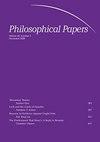解缆:致命的伤害和致命的恐惧
IF 1.3
3区 哲学
0 PHILOSOPHY
引用次数: 4
摘要
对死亡的恐惧一直没有得到当代死亡哲学家的充分解释。这样做的原因是他们关注致命伤害问题,比如为什么死亡对死去的人是坏事。关于对死亡的恐惧的索赔被假定为取决于对死亡的坏处的问题的解决。然而,在实践中,对某些致命伤害问题的共识并没有导致对致命恐惧的类似明确。我认为,我们不能公正地对待对死亡的恐惧,除非我们把它与关于死亡坏处的理论分离开来,包括非常流行的剥夺理论。这种情况包括消除致命伤害的某些方面的歧义,对解释情感所涉及的内容有一个广泛的概念,并密切关注所讨论的恐惧的本质。恐惧死亡的根源是我们脱离了自我导向情绪具有连贯应用的环境;用塞缪尔·舍弗勒(Samuel Scheffler)的话来说,我们的态度变得“飘忽不定”。虽然这不会导致一种自成一体的恐惧,但它确实要求我们将恐惧的对象从幸福的领域中移除,以便理解它。本文章由计算机程序翻译,如有差异,请以英文原文为准。
Unmoored: Mortal Harm and Mortal Fear
Abstract There is a fear of death that persistently eludes adequate explanation from contemporary philosophers of death. The reason for this is their focus on mortal harm issues, such as why death is bad for the person who dies. Claims regarding the fear of death are assumed to be contingent on the resolution of questions about the badness of death. In practice, however, consensus on some mortal harm issues has not resulted in comparable clarity on mortal fear. I contend we cannot do justice to fear of death unless we detach it from theories about the badness of death, including the overwhelmingly popular deprivation theory. The case for this involves disambiguation of certain aspects of mortal harm, a broad conception of what is involved in accounting for an emotion, and close attention to the nature of the fear in question. The source of fear of death is our departure from a context in which self-directed emotions have coherent application; our attitudes become ‘unmoored’, in Samuel Scheffler’s phrase. While this does not result in a fear that is sui generis, it does demand that we remove the object of fear from the realm of well-being in order to make sense of it.
求助全文
通过发布文献求助,成功后即可免费获取论文全文。
去求助
来源期刊

Philosophical Papers
PHILOSOPHY-
CiteScore
2.10
自引率
0.00%
发文量
18
期刊介绍:
Philosophical Papers is an international, generalist journal of philosophy edited in South Africa Original Articles: Articles appearing in regular issues are original, high-quality, and stand-alone, and are written for the general professional philosopher. Submissions are welcome in any area of philosophy and undergo a process of peer review based on initial editor screening and refereeing by (usually) two referees. Special Issues: Topic-based special issues are comprised of both invited and submitted papers selected by guest editors. Recent special issues have included ''Philosophy''s Therapeutic Potential'' (2014, editor Dylan Futter); ''Aging and the Elderly'' (2012, editors Tom Martin and Samantha Vice); ''The Problem of the Criterion'' (2011, editor Mark Nelson); ''Retributive Emotions'' (2010, editor Lucy Allais); ‘Rape and its Meaning/s’ (2009, editor Louise du Toit). Calls for papers for upcoming special issues can be found here. Ideas for future special issues are welcome.
 求助内容:
求助内容: 应助结果提醒方式:
应助结果提醒方式:


